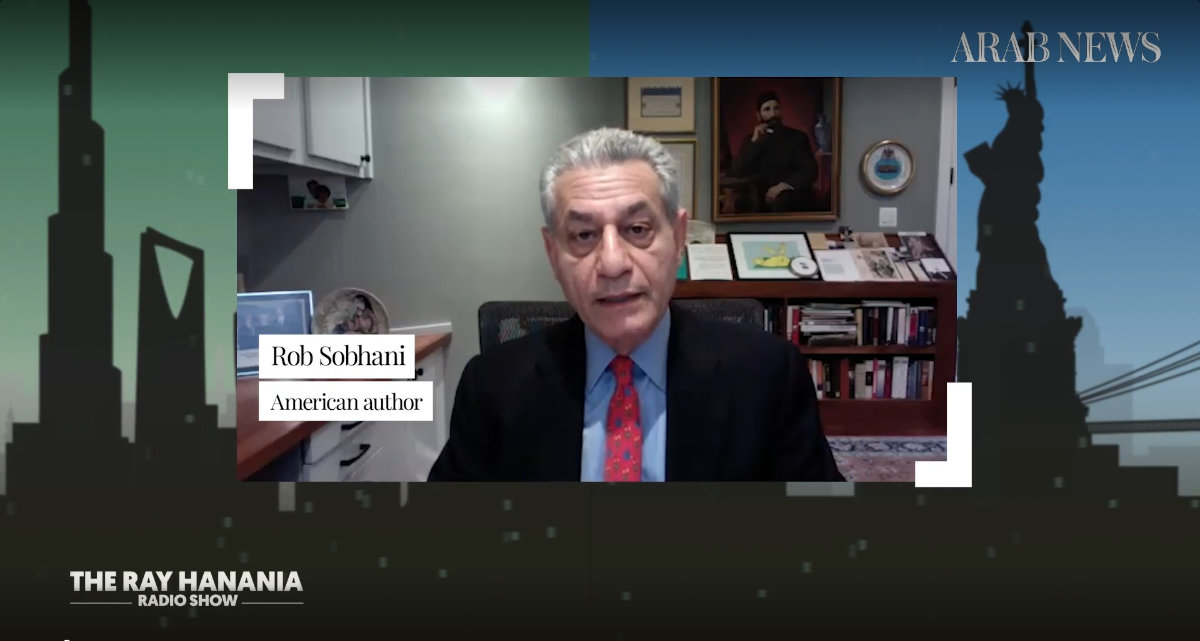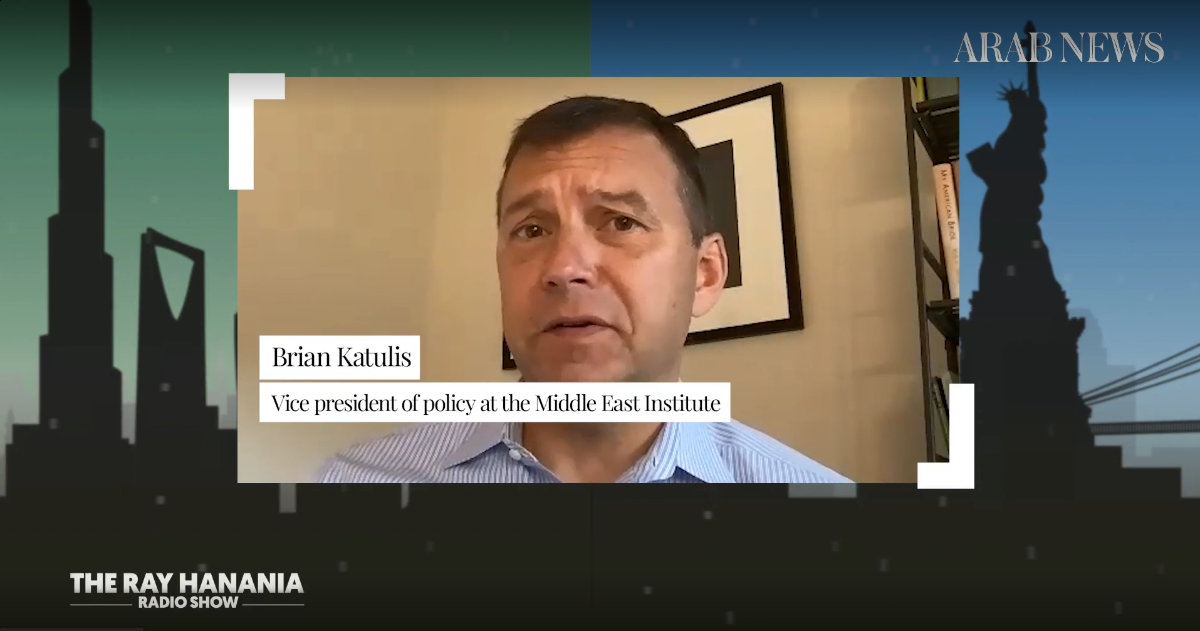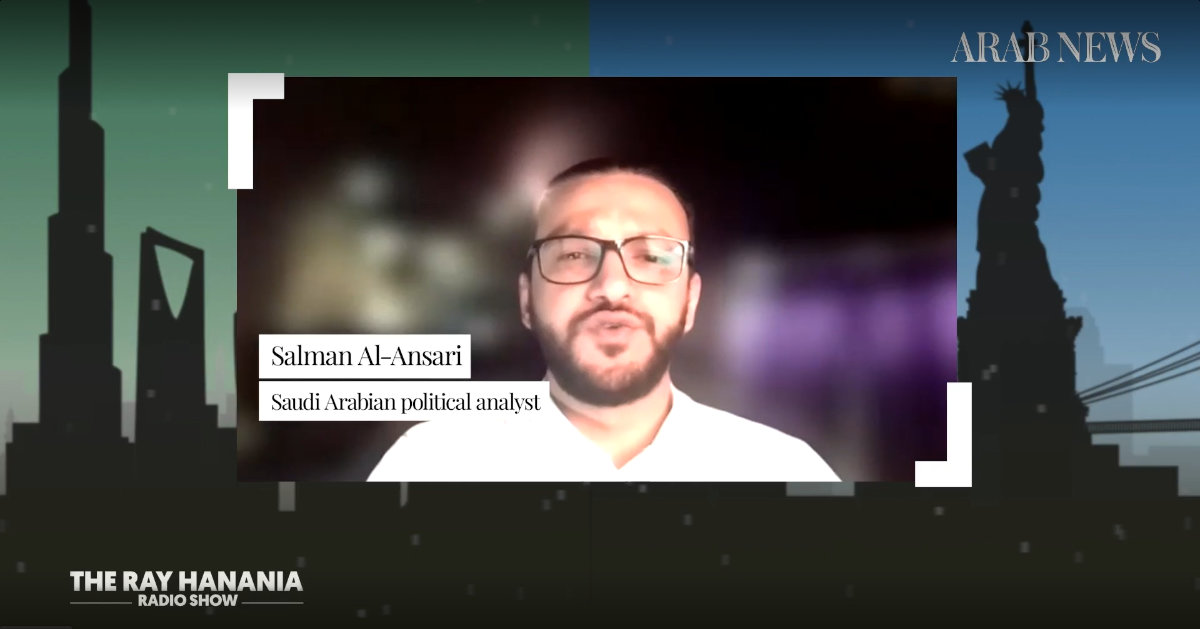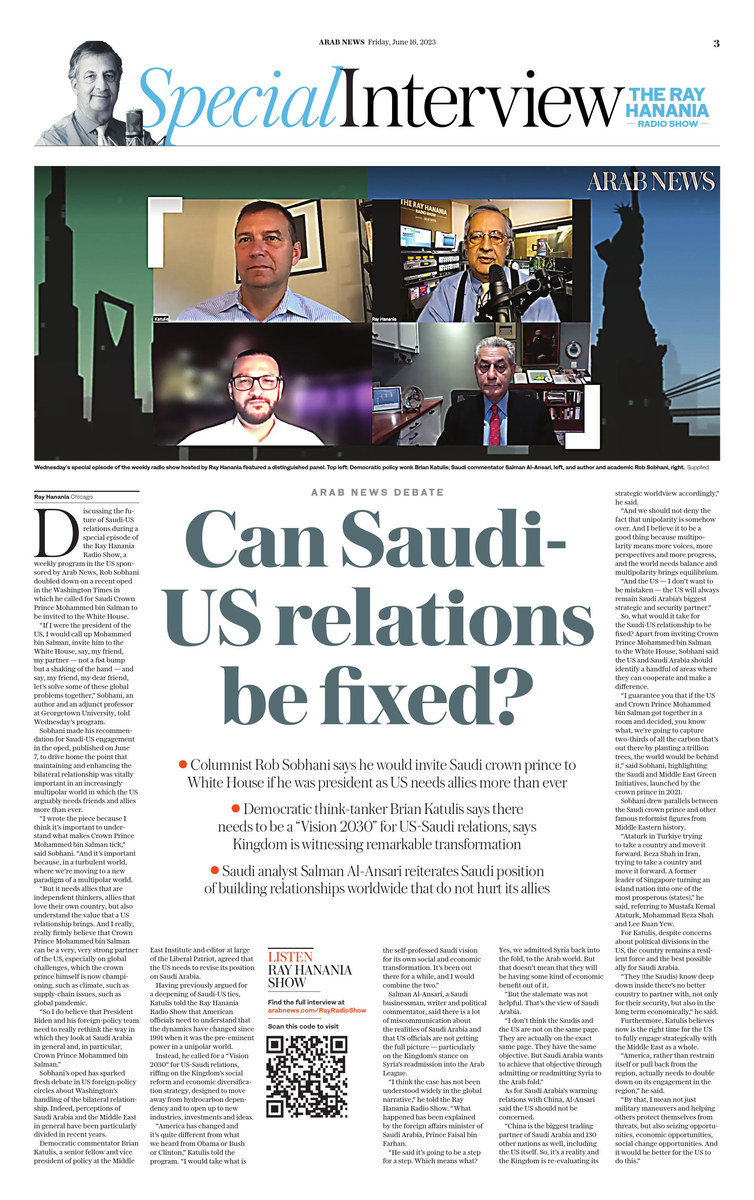CHICAGO: Discussing the future of Saudi-US relations during a special episode of the Ray Hanania Radio Show, a weekly program in the US sponsored by Arab News, Rob Sobhani doubled down on a recent oped in the Washington Times in which he called for Saudi Crown Prince Mohammed bin Salman to be invited to the White House.
“If I were the president of the US, I would call up Mohammed bin Salman, invite him to the White House, say, my friend, my partner — not a fist bump but a shaking of the hand — and say, my friend, my dear friend, let’s solve some of these global problems together,” Sobhani, an author and an adjunct professor at Georgetown University, told Wednesday’s program.
Sobhani made his recommendation for Saudi-US engagement in the oped, published on June 7, to drive home the point that maintaining and enhancing the bilateral relationship was vitally important in an increasingly multipolar world in which the US arguably needs friends and allies more than ever.
“I wrote the piece because I think it’s important to understand what makes Crown Prince Mohammed bin Salman tick,” said Sobhani. “And it’s important because, in a turbulent world, where we’re moving to a new paradigm of a multipolar world.
“But it needs allies that are independent thinkers, allies that love their own country, but also understand the value that a US relationship brings. And I really, really firmly believe that Crown Prince Mohammed bin Salman can be a very, very strong partner of the US, especially on global challenges, which the crown prince himself is now championing, such as climate, such as supply-chain issues, such as global pandemic.

Rob Sobhani: Writer, author and adjunct professor at Georgetown University specializing in US Policy in the Middle East and CEO, chairman, and founder of Caspian Group holdings, LLC.
“So I do believe that President Biden and his foreign-policy team need to really rethink the way in which they look at Saudi Arabia in general and, in particular, Crown Prince Mohammed bin Salman.”
Sobhani’s oped has sparked fresh debate in US foreign-policy circles about Washington’s handling of the bilateral relationship. Indeed, perceptions of Saudi Arabia and the Middle East in general have been particularly divided in recent years.
Asked whether it took a lot of convincing or pushback to publish his op-ed in the Washington Times, Sobhani said the publication could be fair and also critical when it needed to be. He compared it favorably to many of the liberal mainstream media, which, he said, had got it wrong on the Middle East in the past.
“The Washington Times has been a very fair and balanced paper as it concerns Saudi Arabia,” Sobhani told the program. “When the time comes, they’ll be critical. They’ll post critical op-eds. But, overall, they have been extremely, extremely balanced in their writings and in their narratives about Saudi Arabia.
ALSO READ: US needs partners to face challenges, it has no better friend than MBS: Washington Times columnist
“I personally preferred to put this piece in the Washington Times because history suggests that 45, 46, 47 years ago, when the liberal media in this country used the term ‘saint’ for (Iran’s) Ayatollah Khomeini, and now we see the results, it is indeed important that good media balance, media like the Times, be applauded.”
Weighing in on the topic, Democratic commentator Brian Katulis, a senior fellow and vice president of policy at the Middle East Institute and editor at large of the Liberal Patriot, agreed that the US needs to revise its position on Saudi Arabia.
Having previously argued for a deepening of Saudi-US ties, Katulis told the Ray Hanania Radio Show that American officials need to understand that the dynamics have changed since 1991 when it was the pre-eminent power in a unipolar world.
Instead, he called for a “Vision 2030” for US-Saudi relations, riffing on the Kingdom’s social reform and economic diversification strategy, designed to move away from hydrocarbon dependency and to open up to new industries, investments and ideas.
“America has changed and it’s quite different from what we heard from Obama or Bush or Clinton,” Katulis told the program. “I would take what is the self-professed Saudi vision for its own social and economic transformation. It’s been out there for a while, and I would combine the two.
“I’ve talked to very senior US and Saudi officials about the need to do this right and they know it ... So, you have to have a long-term discussion between the two sides, a strategic dialogue, and it’s got to be a conversation. It’s got to be no holds barred. But we’re equal partners and let’s talk about it. And then you would chart it out in each of the different sectors.”

Brian Katulis: a senior fellow and vice president of policy at the Middle East Institute and editor-at-large of The Liberal Patriot.
Asked whether Saudi authorities tend to get on better with Democrats or Republicans, Katulis said there are actually a lot of similarities between both parties on national security topics involving the Middle East.
“If you look at both the Biden administration’s national security strategy document and the Trump administration’s national security strategy document, there’s a lot of similarities actually between the two,” he said.
“And I think if countries like Saudi Arabia did a better job in articulating how they actually will help America advance its interests and even, to some extent, on certain issues like social issues, the values, they’re going to be much more persuasive with politicians on both sides of the aisle on Capitol Hill.
“And ultimately ... 2023 is also not like 2005 or 2013 in that a lot of these national-security questions, and especially Middle East policy questions, quite frankly, are not on the radar screen of American politics the way they used to be. That’s an advantage, but it’s also a disadvantage.”
For his part, Salman Al-Ansari, a Saudi businessman, writer and political commentator, said there is a lot of miscommunication about the realities of Saudi Arabia and that US officials are not getting the full picture — particularly on the Kingdom’s stance on Syria’s readmission into the Arab League.
“I think the case has not been understood widely in the global narrative,” he told the Ray Hanania Radio Show. “What happened has been explained by the foreign affairs minister of Saudi Arabia, Prince Faisal bin Farhan.
“He said it’s going to be a step for a step. Which means what? Yes, we admitted Syria back into the fold, to the Arab world. But that doesn’t mean that they will be having some kind of economic benefit out of it.
“But the stalemate was not helpful. That’s the view of Saudi Arabia. So, if we go back to the Congress bill, with regard to Syria, and the Caesar Bill, which is about the sanctions, it mentioned three major points: To lift the sanctions on Syria. There needs to be a political reform based on (UN Security Council Resolution) 2254. Saudi Arabia wants that.
“Second, to have the sanctions to be lifted, you need to send out or kick out the militias. The Iranian and the foreign militias out of Syria. And Saudi Arabia wants that. The third is to have an amnesty and also to have the opposition and the refugees to be back to Syria. And Saudi Arabia wants that.
“So, I don’t think the Saudis and the US are not on the same page. They are actually on the exact same page. They have the same objective. But Saudi Arabia wants to achieve that objective through admitting or readmitting Syria to the Arab fold.”

Salman Al-Ansari: A Saudi businessman, writer and political commentator, who specializes in strategic and political communications.
As for Saudi Arabia’s warming relations with China, Al-Ansari said the US should not be concerned.
“China is the biggest trading partner of Saudi Arabia and 130 other nations as well, including the US itself. So, it’s a reality and the Kingdom is re-evaluating its strategic worldview accordingly,” he said.
“And we should not deny the fact that unipolarity is somehow over. And I believe it to be a good thing because multipolarity means more voices, more perspectives and more progress, and the world needs balance and multipolarity brings equilibrium.
“And the US — I don’t want to be mistaken — the US will always remain Saudi Arabia’s biggest strategic and security partner.”
Al-Ansari thinks part of the problem with Saudi-US relations is the Kingdom’s inability to communicate its message clearly to an American audience. In fact, as he pointed out, Saudi Arabia is the only G20 country without an English language news channel.
“A TV channel is very important. We should have a lot of English-based networks when it comes to the media to tell our stories,” he said.
“And I’m actually optimistic about the current minister of media in Saudi Arabia, who has been in the field of media for so long and he’s a writer and thinker who can actually advance the Saudi approach to the whole world.
“So maybe that issue of us not being understood is a two way stream. From the other side, we have seen how there is this actually Saudi phobia, unfortunately, and how whatever we do, we are always damned if we do, damned if we don’t.
“That’s one, to blame the US and the Western media for. And the other blame is on us not being vocal and not having institutions that can actually tell our exact stories.”
As a result, Al-Ansari believes there have been several missed opportunities to promote some of the Kingdom’s achievements.
“You don’t hear (about these achievements) in the Western media, or the biased ones, for sure. And that’s one of the reasons that we are not having this kind of good coverage,” he said.
“I remember the Saudi ambassador to the EU, Haifa Al-Judea, pointing out that Saudi Arabia has removed all barriers for women to enter the labor market and said Saudi Arabia introduced laws for equal pay in 2019, which even many of the EU states and the US don’t have.
“So, these things are amazing. These things had not been anticipated just six, seven, eight years ago. And right now we are having this kind of, I would call it a Saudi renaissance that needs to be seen with admiration rather than just being critical for no reason.”
So, what would it take for the Saudi-US relationship to be fixed? Apart from inviting Crown Prince Mohammed bin Salman to the White House, Sobhani said the US and Saudi Arabia should identify a handful of areas where they can cooperate and make a difference.
“I guarantee you that if the US and Crown Prince Mohammed bin Salman got together in a room and decided, you know what, we’re going to capture two-thirds of all the carbon that’s out there by planting a trillion trees, the world would be behind it,” said Sobhani, highlighting the Saudi and Middle East Green Initiatives, launched by the crown prince in 2021.
“If we go to Crown Prince Mohammed bin Salman and argue, let’s build the world’s best cancer cluster so that we can solve the problem of cancer, he will step up to the plate.
“Because guess what? Cancer doesn’t understand Saudi or American. Cancer does not understand Republican or Democrat. Cancer does not understand Salafi or Wahhabi. Cancer kills.
“And if we partner with Saudi Arabia and Mohammed bin Salman, that’s positive for the world.”
Sobhani drew parallels between the Saudi crown prince and other famous reformist figures from Middle Eastern history.
“Ataturk in Turkiye trying to take a country and move it forward. Reza Shah in Iran, trying to take a country and move it forward. A former leader of Singapore turning an island nation into one of the most prosperous (states),” he said, referring to Mustafa Kemal Ataturk, Mohammad Reza Shah and Lee Kuan Yew.
“Yes, along the road there may have been bumps for Mohammed bin Salman, but there is no doubt that he is on the right trajectory to be a leader for his country.”
For Katulis, despite concerns about political divisions in the US, the country remains a resilient force and the best possible ally for Saudi Arabia.
“They (the Saudis) know deep down inside there’s no better country to partner with, not only for their security, but also in the long term economically,” he said.
“I actually think America has an amazing resilience and an ability to correct itself in terms of its own system. And it’s because we have a free media, we have freedom, we have a lot of independence.
“It’s chaotic from time to time. And yes, there are divisions, but I think there is a genuine desire to partner with the US and think about the future.”
Furthermore, Katulis believes now is the right time for the US to fully engage strategically with the Middle East as a whole.
“America, rather than restrain itself or pull back from the region, actually needs to double down on its engagement in the region,” he said.
“By that, I mean not just military maneuvers and helping others protect themselves from threats, but also seizing opportunities, economic opportunities, social change opportunities. And it would be better for the US to do this.”






























